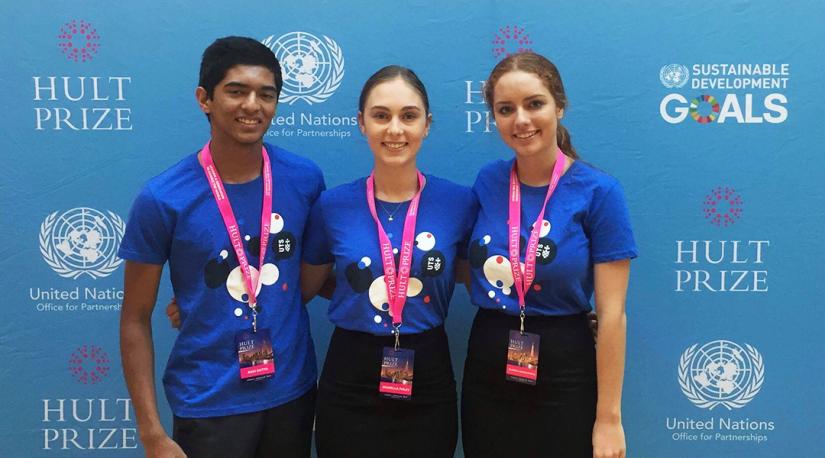Introducing ‘ConnectedU’ - a group of UTS Law students’ solution to world inequality in education. They pitched their idea amidst tough competition at the Melbourne regional final for the prestigious Hult Prize. Ravi Dutta, Daniella Foley and Eugenia Munoz share the story of their bid to change the way a whole continent learns.

Beyond borders
As a team, we recognise the need to help those who are less fortunate than ourselves. All three of us value the notion that if we have the potential to instigate change, and have the resources to do so, then we should use the resources available to us for social good. Such passion led us to compete in the Hult Prize at UTS– the largest student competition for social good in the world.
The Hult Prize challenges teams of university students to devise innovative solutions to global problems, with the opportunity to win up to US$1m in seed capital. Entering the on-campus competition last year was an exciting, yet also incredibly daunting experience. Initially, trying to fathom how we could pitch a social enterprise that harnessed the power of energy to transform the lives of 10 million people by 2025, was a task that seemed far too onerous and complicated.
However, our initial concerns and fears turned into inspiration that led us to select our problem space. Motivated by the idea that education is key to any change, we designed ConnectedU – a venture that leverages the connectivity of energy to improve access to education in South America by democratising effective teaching strategies and collaborative tools.
Our team discovered that students in South America were falling behind in literacy and numeracy, despite over 95% of households having access to electricity. A key underlying reason for underperformance was the poor training of teachers. We, therefore, asked ourselves the question: how might we empower teachers to harness the power of energy through technology to improve the overall quality of education provided to students?
The answer, we believe, lies in ConnectedU, a social enterprise that aims to improve the quality of education in under-resourced schools by removing demographic considerations. We focused on three sustainable development goals: quality education, decent work and economic growth and reduced inequalities – through leveraging an online platform that enables teachers to learn effective teaching strategies and access educational resources for free. A prototype of our platform can be accessed here.
Pitching to win
Participating in the on-campus event was a steep learning curve for us. As a team we learnt that social good and profit need not be separate. We were fortunate enough to be mentored by Shaun Chung of MinterEllison, a lawyer with a keen interest in innovation and entrepreneurship. Chung’s mentorship helped us tailor our idea into a feasible and scalable business proposition, preparing us to pitch in front of a panel of esteemed judges from the social enterprise and start-up space. These judges included Harrison Uffindell (Head of Business Operations in Australia and New Zealand at Airbnb), Parrys Raines (CEO at Future Business Generation), Margaret Maile Petty (Executive Director of Innovation and Entrepreneurship at UTS), Ahmed Haider (CEO and Founder at Zookal), James Tilbury (Operations Director at EnergyLab) and Ashley Blake (Innovation Manager at Commonwealth Bank). Being able to access the insights and expertise of these judges through the positive and constructive feedback we received was an invaluable opportunity. But our journey to impact was not over, as we were placed third at the on-campus event!
In doing so, we were highly encouraged by our campus director, Lik, to apply for a wildcard position and, much to our surprise, we were then competitively selected to compete against over 40 universities from across the world at a regional final in Melbourne. So we continued honing our pitch through workshops with the Sydney School of Entrepreneurship and Future Business Generation, whilst keeping contact with Chung. We would like to thank each of them for their support. We would also like to extend a thank you to UTS’s Innovation and Entrepreneurship Unit for sponsoring our journey to impact in Melbourne.
While we were unsuccessful in progressing to the next stage of the competition, we are incredibly thankful as we have been able to meet teams from around the world, including the University of North Carolina and the University of Pennsylvania, and have become inspired by their passion to change it. We have also been able to meet social entrepreneurs and hear them share their journey to impact on how they built their startup from just an idea. It gave us great insight into super lean prototyping, building a business whilst being at university and being smart with money. We cannot emphasise enough what an incredible experience this competition was, from start to finish, and in the words of Nike, we highly recommend everyone to just do it!
To find out about more entrepreneurship opportunities from UTS, sign up to the UTS Innovation and Entrepreneurship mailing list here.

